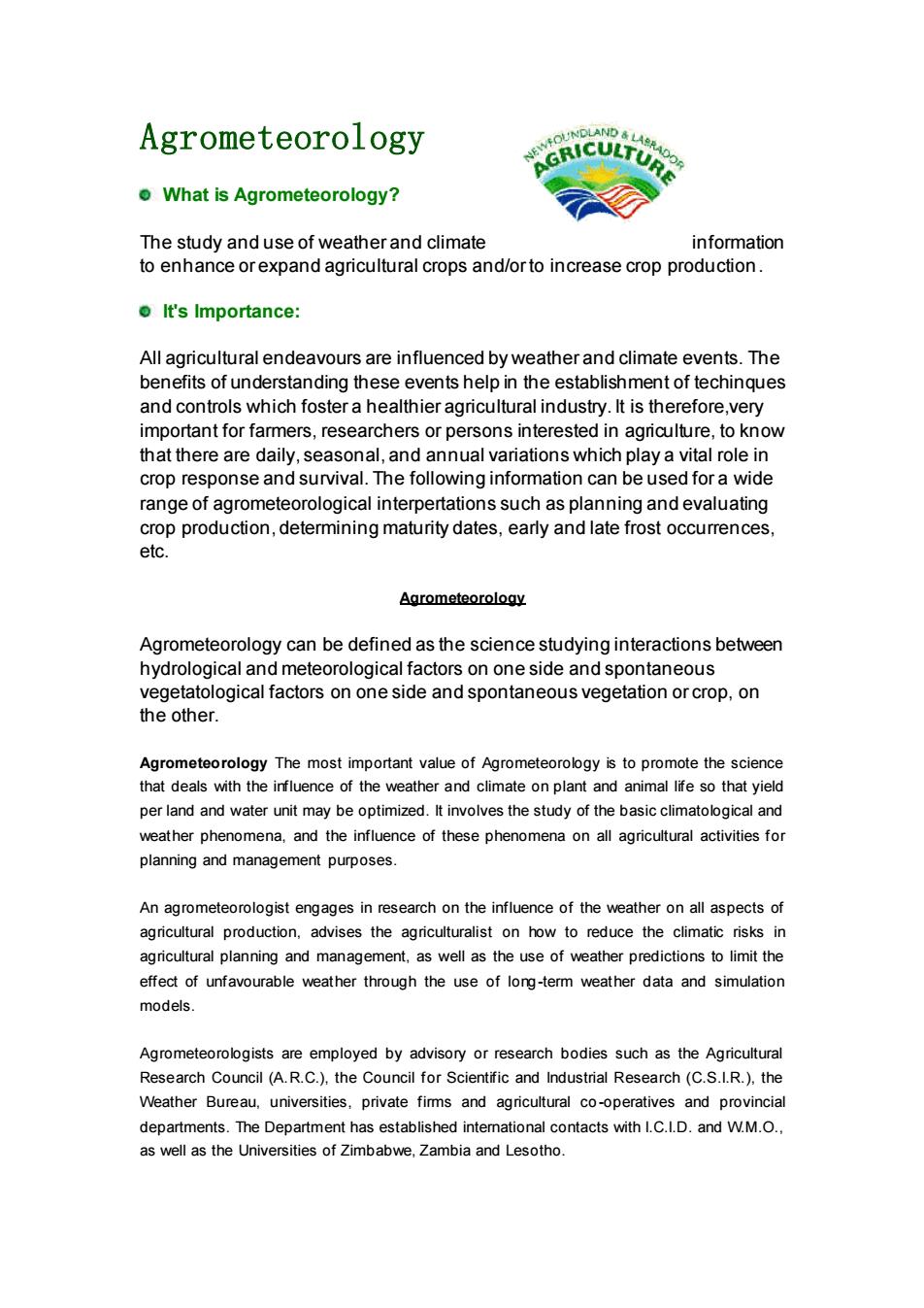
AgrometeorologyANLRICULTWhatisAgrometeorology?The study and use of weatherand climateinformationto enhanceorexpandagricultural crops and/orto increase crop production.It'sImportance:Allagriculturalendeavours are influenced byweatherand climate events.Thebenefits ofunderstanding these events help in the establishment of techinquesandcontrolswhichfosterahealthieragriculturalindustry.Itistherefore,veryimportantforfarmers,researchers orpersons interested in agriculture,toknowthatthere are daily,seasonal,and annual variations which playa vital role incrop responseand survival.Thefollowing information canbeusedfora widerange ofagrometeorological interpertations such as planning and evaluatingcropproduction,determiningmaturitydates,earlyandlatefrostoccurrences,etc.AgrometeorologyAgrometeorologycanbedefinedasthesciencestudyinginteractionsbetweenhydrologicalandmeteorologicalfactorsononesideandspontaneousvegetatologicalfactors on oneside and spontaneousvegetation orcrop,onthe other.Agrometeorology The most importantvalueof Agrometeorologyis topromotethesciencethat deals with the influence of the weather and climate on plant and animal life so that yieldperland and waterunitmay be optimized.It involvesthe studyof thebasicclimatological andweather phenomena, and the influence of these phenomena on all agricultural activities forplanningandmanagementpurposesAn agrometeorologist engages in research on the influence of the weather on all aspects ofagricultural production, advises the agriculturalist on how to reduce the climatic risks inagricultural planning and management, as well as the use of weather predictions to limit theeffect of unfavourable weather through the use of long-term weather data and simulationmodels.Agrometeorologists are employed byadvisoryorresearch bodies suchastheAgriculturalResearch Council (A.R.C.),the Council for Scientific and Industrial Research (C.S.I.R.), theWeather Bureau,universities,private fims and agricultural co-operatives and provincialdepartments.TheDepartment has established international contacts withI.C.I.D.and W.M.O.,aswellasthe Universities ofZimbabwe,Zambia and Lesotho
Agrometeorology What is Agrometeorology? The study and use of weather and climate information to enhance or expand agricultural crops and/or to increase crop production . It's Importance: All agricultural endeavours are influenced by weather and climate events. The benefits of understanding these events help in the establishment of techinques and controls which foster a healthier agricultural industry. It is therefore,very important for farmers, researchers or persons interested in agriculture, to know that there are daily, seasonal, and annual variations which play a vital role in crop response and survival. The following information can be used for a wide range of agrometeorological interpertations such as planning and evaluating crop production, determining maturity dates, early and late frost occurrences, etc. Agrometeorology Agrometeorology can be defined as the science studying interactions between hydrological and meteorological factors on one side and spontaneous vegetatological factors on one side and spontaneous vegetation or crop, on the other. Agrometeorology The most important value of Agrometeorology is to promote the science that deals with the influence of the weather and climate on plant and animal life so that yield per land and water unit may be optimized. It involves the study of the basic climatological and weather phenomena, and the influence of these phenomena on all agricultural activities for planning and management purposes. An agrometeorologist engages in research on the influence of the weather on all aspects of agricultural production, advises the agriculturalist on how to reduce the climatic risks in agricultural planning and management, as well as the use of weather predictions to limit the effect of unfavourable weather through the use of long-term weather data and simulation models. Agrometeorologists are employed by advisory or research bodies such as the Agricultural Research Council (A.R.C.), the Council for Scientific and Industrial Research (C.S.I.R.), the Weather Bureau, universities, private firms and agricultural co -operatives and provincial departments. The Department has established international contacts with I.C.I.D. and W.M.O., as well as the Universities of Zimbabwe, Zambia and Lesotho